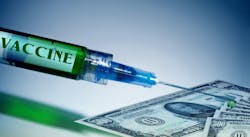Pfizer and BioNTech plan to file FDA EUA application for COVID-19 vaccine candidate
Pfizer and BioNTech announced that they plan to submit a request for emergency use authorization (EUA) to the U.S. Food and Drug Administration (FDA) within days for their COVID-19 vaccine candidate, BNT162b2, based on the totality of safety and efficacy data collected to date, as well as manufacturing data relating to the quality and consistency of the vaccine, according to a press release.
The companies also announced that after conducting the final efficacy analysis in their ongoing Phase 3 study, their mRNA-based COVID-19 vaccine candidate met all of the study’s primary efficacy endpoints.
An analysis of the Phase 3 data indicated a vaccine efficacy rate of 95percent in participants without prior SARS-CoV-2 infection (first primary objective) and also in participants with and without prior SARS-CoV-2 infection (second primary objective) in each case measured from seven days after the second dose. The first primary objective analysis is based on 170 cases of COVID-19, as specified in the study protocol, of which 162 cases of COVID-19 were observed in the placebo group versus eight cases in the BNT162b2 group. Efficacy was consistent across age, gender, race and ethnicity demographics. The observed efficacy in adults over 65 years of age was over 94 percent.
There were 10 severe cases of COVID-19 observed in the trial, with nine of the cases occurring in the placebo group and one in the BNT162b2 vaccinated group.
To date, the Data Monitoring Committee for the study has not reported any serious safety concerns related to the vaccine. A review of unblinded reactogenicity data from the final analysis—which consisted of a randomized subset of at least 8,000 participants 18 years and older in the phase 2/3 study—demonstrated that the vaccine was well tolerated, with most solicited adverse events resolving shortly after vaccination. The only Grade 3 (severe) solicited adverse events greater than or equal to 2 percent in frequency after the first or second dose was fatigue at 3.8 percent and headache at 2.0 percent following the second dose. Consistent with earlier shared results, older adults tended to report fewer and milder solicited adverse events following vaccination.
The Phase 3 clinical trial of BNT162b2 began on July 27 and has enrolled 43,661 participants to date, 41,135 of whom have received a second dose of the vaccine candidate as of November 13, 2020. Approximately 42 percent of global participants and 30 percent of U.S. participants have racially and ethnically diverse backgrounds, and 41 percent of global and 45 percent of U.S. participants are 56-85 years of age.
To help refine the plan for the delivery and deployment of their COVID-19 vaccine candidate, the companies plan to launch a COVID-19 pilot immunization program with four U.S. states.
The four states selected are Rhode Island, Texas, New Mexico, and Tennessee. They were selected for the program because of their differences in overall size, diversity of populations, and immunization infrastructure, as well as the states’ need to reach individuals in varied urban and rural settings, Pfizer said, adding that the states will not receive vaccine doses earlier than other states by virtue of this pilot and they will not receive any differential consideration.
Based on current projections, the companies expect to produce globally up to 50 million vaccine doses in 2020 and up to 1.3 billion doses by the end of 2021. Four of Pfizer’s facilities are part of the manufacturing and supply chain; St. Louis, MO; Andover, MA; and Kalamazoo, MI in the U.S.; and Puurs in Belgium. BioNTech’s German sites will also be leveraged for global supply.
In July, Pfizer and BioNTech announced the execution of an agreement with the U.S. Department of Health and Human Services and the Department of Defense to begin delivering 100 million doses of a vaccine for COVID-19 in 2021. Under the agreement, the U.S. government will first receive 100 million doses of the Pfizer-BioNTech COVID-19 vaccine after Pfizer successfully manufactures and obtains approval or EUA from FDA. The U.S. government will pay $1.95 billion for those first 100 million doses, with the option to acquire up to an additional 500 million doses.

